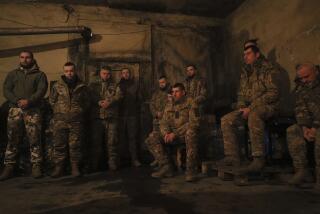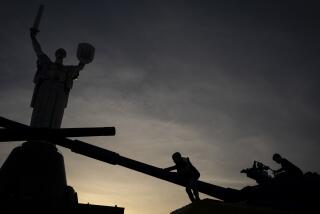ORANGE COUNTY VOICES POLITICS : Lithuania Needs Help in Quest for Independence : The people have spoken in the country’s first multi-party elections in 50 years. Now it’s up to the West to take a stand.
- Share via
As the airplane bound from Moscow for the Lithuanian capital of Vilnius was about to touch down, images of the distant past were racing through my mind. I had to steady myself to confirm that I was going to land again in the country of my birth. I was going to be in the midst of historic events that would decide the future of this country and might affect the future of the Soviet Union itself.
I could not help but recall the moments in 1944 when my parents and I had to flee the country by means of a horse and buggy to escape the Russian tanks that were in pursuit of the German army.
A lot has happened since then. The country and its people have undergone an oppression unparalleled in its history. It had to withstand deportation of 350,000 of its citizens to Siberia, most of whom died there of hunger and exposure. Some of them were my relatives. An additional 900,000 people were displaced to other parts of Russia or its occupied territories to make room for the Russians--all a part of Stalin’s plan of genocide. It had to withstand the imprisonment and killing of many of its statesmen, teachers, doctors, businessmen and priests; the closing of schools, seminaries and convents; the conversion of churches to warehouses and museums of atheism. It also had to withstand a perverted justice system in which any normal pursuit of freedom was considered a crime and the dehumanization in the name of Lenin was considered a virtue.
But history has taught us that tyranny always comes to an end, because the human spirit cannot be enslaved forever. The events in the Soviet Union are a consequence of the same desires for liberty expressed by our own founding fathers. The only question remaining is whether in the transition the dying monster called communism will wag its destructive tail a la Tian An Men Square before giving up its ghost.
And so the consequences of Feb. 24’s first multi-party elections in Lithuania in 50 years were seen as a clue not only to the further developments in this Baltic Republic, but also in the Soviet Union itself.
The answers started emerging as the election results began coming in. Sajudis candidates captured 72 of the 90 seats decided. Runoff elections must still be held in 45 districts where no candidate received a majority and new candidates have to be nominated in six additional districts because of pre-election irregularities generated by the Communist Party. But it is now predicted that the Sajudis-supported candidates will win a substantial share of the additional vote.
What does all of it mean? The platform adopted by the Sajudis Election Conference on Feb. 3 stated that the main objective in the areas of foreign and domestic policy, economy, culture, social welfare and ecology is total and complete independence.
The Lithuanian vote was therefore a referendum on the platform for independence. The overwhelming vote in favor of the platform makes it clear to Moscow as well as the West what the people want.
The vote shook up Moscow rulers. They immediately began drafting legislation in the Supreme Soviet to give themselves the power to declare an emergency in any republic regardless of whether the republic itself wants to declare such a condition. This means that Moscow can declare an emergency on any pretext and move in to take care of any problem it perceives is threatening its strategic interests.
On the other hand, these elections will also force the West to declare its position on Lithuania’s independence. Our government in particular will be forced to get off the fence. So far it has religiously supported the longstanding U.S. policy of non-recognition of Lithuania’s incorporation into the Soviet Union. But recent comments to the press by the President and the secretary of state consider the question of independence of the Baltic countries of Lithuania, Latvia and Estonia as an internal affair of the Soviet Union. Well, which way is it going to be?
This kind of double talk is not new to the Balts. They felt abandoned by the world in 1940 when the Russian tanks rolled in, then again at Yalta and Potsdam at the end of World War II when the four superpowers decided on the borders of Eastern Europe, leaving the Balts enslaved. Then again by President Ford at Helsinki, where in exchange for human rights in the Soviet Union, the existing borders were implicitly accepted as valid. How is our President going to act now?
When I left Lithuania last Tuesday, it was determined to continue its quest toward total independence. The first battle was won! The people have spoken, the message is clear, their voices are crying out to the world to take notice and to come, finally, to their aid.
It is good to be back home and to relish again the freedom that is normally taken for granted here. But I came back concerned whether the election far away in Lithuania will have any meaning to my neighbors and friends, and whether support can be garnered to reestablish democracy there.
Despite the dramatic election results, I have fears for my relatives in Lithuania. There is still the threat that the Russians will retaliate and shut off vital supplies of heating and motor vehicle fuels and medical supplies. There is also the underlying fear of how the Russian military will behave in light of the people’s announced intention of declaring their independence. I am also apprehensive about how our government will behave because it has been sitting on the fence so long. Rep. C. Christopher Cox (R-Newport Beach) and three of his colleagues made their support clear. America, where do you stand?
More to Read
Sign up for Essential California
The most important California stories and recommendations in your inbox every morning.
You may occasionally receive promotional content from the Los Angeles Times.













